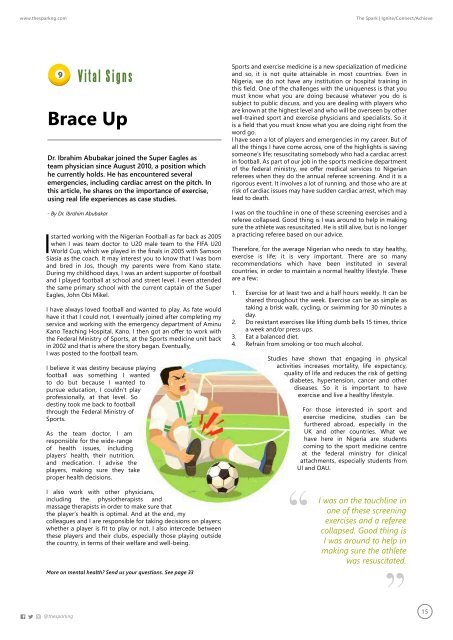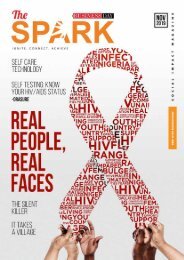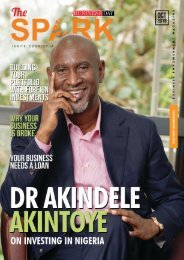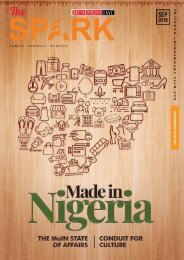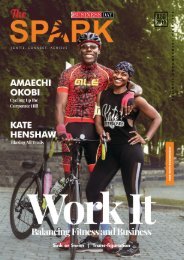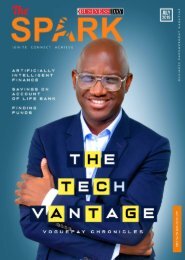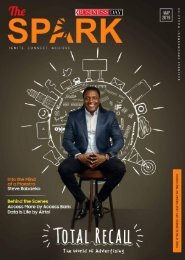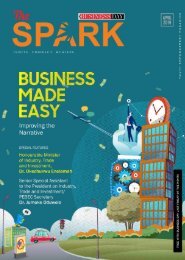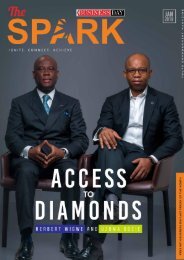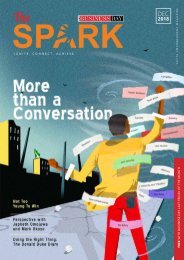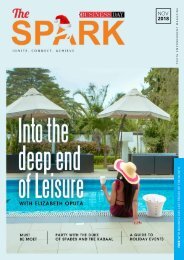You also want an ePaper? Increase the reach of your titles
YUMPU automatically turns print PDFs into web optimized ePapers that Google loves.
www.thesparkng.com<br />
<strong>The</strong> <strong>Spark</strong> | Ignite/Connect/Achieve<br />
Vital Signs<br />
Brace Up<br />
Dr. Ibrahim Abubakar joined the Super Eagles as<br />
team physician since August 2010, a position which<br />
he currently holds. He has encountered several<br />
emergencies, including cardiac arrest on the pitch. In<br />
this article, he shares on the importance of exercise,<br />
using real life experiences as case studies.<br />
- By Dr. Ibrahim Abubakar<br />
I<br />
started working with the Nigerian Football as far back as 2005<br />
when I was team doctor to U20 male team to the FIFA U20<br />
World Cup, which we played in the finals in 2005 with Samson<br />
Siasia as the coach. It may interest you to know that I was born<br />
and bred in Jos, though my parents were from Kano state.<br />
During my childhood days, I was an ardent supporter of football<br />
and I played football at school and street level. I even attended<br />
the same primary school with the current captain of the Super<br />
Eagles, John Obi Mikel.<br />
I have always loved football and wanted to play. As fate would<br />
have it that I could not, I eventually joined after completing my<br />
service and working with the emergency department of Aminu<br />
Kano Teaching Hospital, Kano. I then got an offer to work with<br />
the Federal Ministry of Sports, at the Sports medicine unit back<br />
in 2002 and that is where the story began. Eventually,<br />
I was posted to the football team.<br />
I believe it was destiny because playing<br />
football was something I wanted<br />
to do but because I wanted to<br />
pursue education, I couldn’t play<br />
professionally, at that level. So<br />
destiny took me back to football<br />
through the Federal Ministry of<br />
Sports.<br />
As the team doctor, I am<br />
responsible for the wide-range<br />
of health issues, including<br />
players’ health, their nutrition,<br />
and medication. I advise the<br />
players, making sure they take<br />
proper health decisions.<br />
Sports and exercise medicine is a new specialization of medicine<br />
and so, it is not quite attainable in most countries. Even in<br />
Nigeria, we do not have any institution or hospital training in<br />
this field. One of the challenges with the uniqueness is that you<br />
must know what you are doing because whatever you do is<br />
subject to public discuss, and you are dealing with players who<br />
are known at the highest level and who will be overseen by other<br />
well-trained sport and exercise physicians and specialists. So it<br />
is a field that you must know what you are doing right from the<br />
word go.<br />
I have seen a lot of players and emergencies in my career. But of<br />
all the things I have come across, one of the highlights is saving<br />
someone’s life; resuscitating somebody who had a cardiac arrest<br />
in football. As part of our job in the sports medicine department<br />
of the federal ministry, we offer medical services to Nigerian<br />
referees when they do the annual referee screening. And it is a<br />
rigorous event. It involves a lot of running, and those who are at<br />
risk of cardiac issues may have sudden cardiac arrest, which may<br />
lead to death.<br />
I was on the touchline in one of these screening exercises and a<br />
referee collapsed. Good thing is I was around to help in making<br />
sure the athlete was resuscitated. He is still alive, but is no longer<br />
a practicing referee based on our advice.<br />
<strong>The</strong>refore, for the average Nigerian who needs to stay healthy,<br />
exercise is life; it is very important. <strong>The</strong>re are so many<br />
recommendations which have been instituted in several<br />
countries, in order to maintain a normal healthy lifestyle. <strong>The</strong>se<br />
are a few:<br />
1. Exercise for at least two and a half hours weekly. It can be<br />
shared throughout the week. Exercise can be as simple as<br />
taking a brisk walk, cycling, or swimming for 30 minutes a<br />
day.<br />
2. Do resistant exercises like lifting dumb bells 15 times, thrice<br />
a week and/or press ups.<br />
3. Eat a balanced diet.<br />
4. Refrain from smoking or too much alcohol.<br />
Studies have shown that engaging in physical<br />
activities increases mortality, life expectancy,<br />
quality of life and reduces the risk of getting<br />
diabetes, hypertension, cancer and other<br />
diseases. So it is important to have<br />
exercise and live a healthy lifestyle.<br />
For those interested in sport and<br />
exercise medicine, studies can be<br />
furthered abroad, especially in the<br />
UK and other countries. What we<br />
have here in Nigeria are students<br />
coming to the sport medicine centre<br />
at the federal ministry for clinical<br />
attachments, especially students from<br />
UI and OAU.<br />
I also work with other physicians,<br />
including the physiotherapists and<br />
massage therapists in order to make sure that<br />
the player’s health is optimal. And at the end, my<br />
colleagues and I are responsible for taking decisions on players;<br />
whether a player is fit to play or not. I also intercede between<br />
these players and their clubs, especially those playing outside<br />
the country, in terms of their welfare and well-being.<br />
More on mental health? Send us your questions. See page 33<br />
“<br />
I was on the touchline in<br />
one of these screening<br />
exercises and a referee<br />
collapsed. Good thing is<br />
I was around to help in<br />
making sure the athlete<br />
was resuscitated.<br />
“<br />
@thesparkng<br />
15


